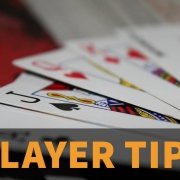Table Talk – When to Walk Away
Happy Holidays everyone! I hope you are staying warm and dry this season, as it sure has been cold and wet lately. The change in weather combined with people taking time off of work means that the action inside the California Grand Casino has been heating up! We’ve talked a lot about various aspects of poker strategy in the past, but something that doesn’t get covered very often is how to quit a poker game. How does a player know when it is time to get up from the table and call it a day? It’s not nearly as easy as it sounds. When do you quit when you are running well and winning pots? When do you quit when things aren’t going your way? The reasons vary from person to person, so there’s no single right answer I can give you. What I can tell you is that there are some factors to consider when deciding whether or not to get up from a poker game, and by taking a few moments to really consider your motivations and options, you should be able to figure out exactly what course of action is right for you.
In order to answer the question of when to walk away, you have to first establish why you started in the first place. Everyone starts because they want to play poker, but it goes beyond that. Why do you play poker? What motivated you to sit down at the poker table today? Let’s discuss a few of the main reasons that people play poker and when they should quit based on their individual motivations for playing.
Playing for fun
You love poker. You’re the type of player that plays to relax, unwind, socialize, and have a good time. You come after work to de-stress and sometimes come in on the weekends to enjoy some friendly competition. Poker to you is simply a fun game that provides recreation, interaction, and occasionally a little extra spending cash. When should you get up from the game? Get up from the game when the game ceases to be what you want it to be anymore. If you came to enjoy yourself and relax, and yet find yourself getting frustrated by bad beats or irritated by the chatterbox sitting to your left, then it’s time to take a break and consider cashing out. Maybe a break or a quick bite to eat is all you need and you can get back to enjoying the game. If not, then perhaps it’s time to end the session.
Another reason a recreational player may want to quit the game is when he or she simply has other responsibilities to attend to. If you are someone with a lot of things to take care of, I would suggest giving yourself a time limit and sticking to it. You can be a bit flexible if things are going extremely well and you’re having an absolute blast, but for the most part you should keep your promise to yourself and abide by your self imposed poker curfew.
Playing for keeps
You are a serious player. You’re competitive, better than most, and came to win. Don’t let others be fooled, you love a great time on the felt just as much as the next guy, but the chips are what brought you here and you plan to walk out with a ton! You work on your game and discuss strategy with your peers. You even read a small poker blog to see if there are any pearls of wisdom hidden among the verbosity! When should you get up from the game? That can be a bit of a trickier question than it is for a recreational player because there are factors outside of yourself to consider. Firstly, do you have the time to continue to play? If deciding to continue to play puts you on the clock and you’ll have to leave by a certain time, then it’s definitely best to call it a day. Playing with a fixed time limit looming can throw even the best players off of their A game. Speaking of playing your A game, that’s another reason to cash out. Any time you’re not playing your A game and you become aware of it, take a quick mental break. Ask yourself why you slipped from playing your A game and answer yourself honestly. If you can get back to the top of your game, then it’s safe to carry on. If other factors are contributing to your sub-par play such as being tired, tilted, or tense, then perhaps you would be best served heading to the cage.
As poker players there are so many things that we have little control over; our opponents’ actions, what cards will come, and any number of other variables in a card room. One of the few things we do have control over is when we get up from the game. A little bit of self reflection and honesty is all that is needed to help you arrive at the conclusion that’s right for you. Until next time, see you at the tables!


